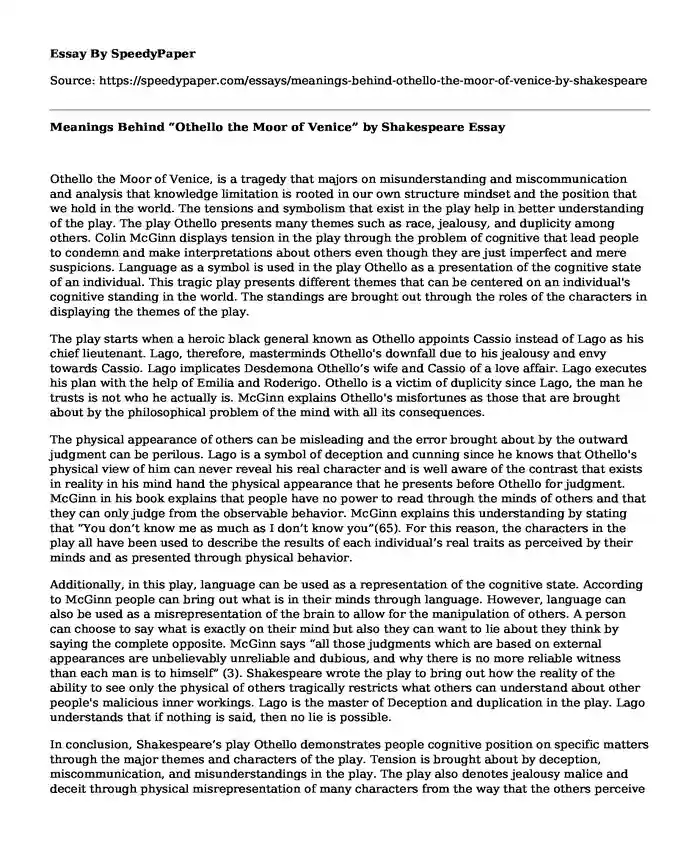
| Type of paper: | Critical thinking |
| Categories: | Strategy Nursing Security Other |
| Pages: | 3 |
| Wordcount: | 656 words |
Othello the Moor of Venice, is a tragedy that majors on misunderstanding and miscommunication and analysis that knowledge limitation is rooted in our own structure mindset and the position that we hold in the world. The tensions and symbolism that exist in the play help in better understanding of the play. The play Othello presents many themes such as race, jealousy, and duplicity among others. Colin McGinn displays tension in the play through the problem of cognitive that lead people to condemn and make interpretations about others even though they are just imperfect and mere suspicions. Language as a symbol is used in the play Othello as a presentation of the cognitive state of an individual. This tragic play presents different themes that can be centered on an individual's cognitive standing in the world. The standings are brought out through the roles of the characters in displaying the themes of the play.
The play starts when a heroic black general known as Othello appoints Cassio instead of Lago as his chief lieutenant. Lago, therefore, masterminds Othello's downfall due to his jealousy and envy towards Cassio. Lago implicates Desdemona Othello's wife and Cassio of a love affair. Lago executes his plan with the help of Emilia and Roderigo. Othello is a victim of duplicity since Lago, the man he trusts is not who he actually is. McGinn explains Othello's misfortunes as those that are brought about by the philosophical problem of the mind with all its consequences.
The physical appearance of others can be misleading and the error brought about by the outward judgment can be perilous. Lago is a symbol of deception and cunning since he knows that Othello's physical view of him can never reveal his real character and is well aware of the contrast that exists in reality in his mind hand the physical appearance that he presents before Othello for judgment. McGinn in his book explains that people have no power to read through the minds of others and that they can only judge from the observable behavior. McGinn explains this understanding by stating that "You don't know me as much as I don't know you"(65). For this reason, the characters in the play all have been used to describe the results of each individual's real traits as perceived by their minds and as presented through physical behavior.
Additionally, in this play, language can be used as a representation of the cognitive state. According to McGinn people can bring out what is in their minds through language. However, language can also be used as a misrepresentation of the brain to allow for the manipulation of others. A person can choose to say what is exactly on their mind but also they can want to lie about they think by saying the complete opposite. McGinn says "all those judgments which are based on external appearances are unbelievably unreliable and dubious, and why there is no more reliable witness than each man is to himself" (3). Shakespeare wrote the play to bring out how the reality of the ability to see only the physical of others tragically restricts what others can understand about other people's malicious inner workings. Lago is the master of Deception and duplication in the play. Lago understands that if nothing is said, then no lie is possible.
In conclusion, Shakespeare's play Othello demonstrates people cognitive position on specific matters through the major themes and characters of the play. Tension is brought about by deception, miscommunication, and misunderstandings in the play. The play also denotes jealousy malice and deceit through physical misrepresentation of many characters from the way that the others perceive them. Othello is the main character of the play who tragically falls a victim of miscommunication and deception from Lago and his accomplices. Colin McGinn aids in discovering the meaning behind the play by focusing on the difference between the outer and the inner representation through the characters of the play.
Cite this page
Meanings Behind "Othello the Moor of Venice" by Shakespeare. (2023, Jan 05). Retrieved from https://speedypaper.com/essays/meanings-behind-othello-the-moor-of-venice-by-shakespeare
Request Removal
If you are the original author of this essay and no longer wish to have it published on the SpeedyPaper website, please click below to request its removal:
- Reproductive system
- Paper Sample with a Graphic Design Personal Statement
- Japanese Woodblock Prints Essay Sample
- Elements toward Building an Argumentation Essay Example
- Behavior of Markets - Macroeconomics Essay Example
- Essay Example. Market-Based Evaluation Method
- Essay Sample on Dick's Sporting Goods
Popular categories




